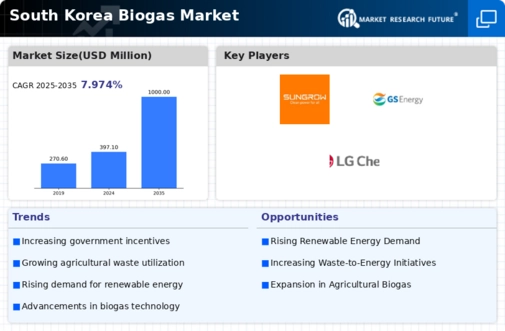South Korea Biogas Market Summary
The South Korea Biogas Market is projected to grow significantly, reaching 1000 USD Million by 2035.
Key Market Trends & Highlights
South Korea Biogas Market Key Trends and Highlights
- The market valuation for South Korea Biogas Market is expected to increase from 397.1 USD Million in 2024 to 1000 USD Million by 2035.
- The compound annual growth rate (CAGR) for the South Korea Biogas Market is estimated at 8.76 percent from 2025 to 2035.
- This growth trajectory indicates a robust expansion in the biogas sector, driven by increasing energy demands and sustainability initiatives.
- Growing adoption of biogas technology due to the rising emphasis on renewable energy sources is a major market driver.
Market Size & Forecast
| 2024 Market Size | 397.1 (USD Million) |
| 2035 Market Size | 1000 (USD Million) |
| CAGR (2025-2035) | 8.76% |
Major Players
Sungrow Power Supply, GS Energy, Daewoo Engineering & Construction, Samsun C&T, Hanjin Transportation, Hanwha Energy, Bioenergy Korea, Daejeon Technopark, SK E&C, Korea Biogas Association, Korea Gas Corporation, LG Chem, Green Energy Connection, KOSPO













